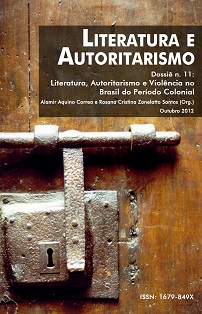The space of domination and enclosure in Inocência, by Visconde de Taunay
DOI:
https://doi.org/10.5902/1679849X78442Keywords:
Literature, Feminine, Male domination, RepresentationAbstract
The representation of woman in literature is a constant in literary creation and, according to its movements of the production, circulation and conventions, underwent expressive transformations, that communed with the historical and social transformations. Currently, the literature has opened the range of discussions, decentralizing the male values, and redirecting the gaze on the scene that is painted in the context of the figuration of women. This article aims to present a reading of the representation of Inocência, by Visconde de Taunay, point of view of construction of the female, considering the context of production, the historical and social pressures that embrace the process of literary creation.
Downloads
References
D’ÁVILA NETO, Maria Inácia. O autoritarismo e a mulher. Rio de Janeiro: Achiamé, 1980.
BOURDIEU, Pierre. A dominação masculina. 2. ed. Rio de Janeiro: Bertrand Brasil, 2002.
BOURDIEU, Pierre. As regras da arte: gênese e estrutura do campo literário. São Paulo: Companhia das Letras, 1996.
COUTINHO, Afrânio. A literatura no Brasil. São Paulo: Global, 2004. (V. 6).
MOISÉS, Massaud. História da Literatura Brasileira: Das Origens ao Romantismo. 2. ed. São Paulo: Cultrix, 2004.
SPIVAK, Gayatri Chakravorty. Pode o subalterno falar? Trad. Sandra Regina Goulart Almeida, Marcos Pereira Feitosa, André Pereira Feitosa. Belo Horizonte: UFMG, 2010.
TAUNAY, Visconde de. Inocência. São Paulo: Martin Claret, 2001.
ZOLIN, Lucia Osana. Crítica Feminista. In: BONICCI, Thomas; ZOLIN, Lucia Osana (Orgs). Teoria Literária: Abordagens Históricas e Tendências Contemporâneas. Maringá, EDUEM, 2004.
Downloads
Published
How to Cite
Issue
Section
License
DECLARAÇÃO DE ORIGINALIDADE E EXCLUSIVIDADE E CESSÃO DE DIREITOS AUTORAIS
Declaro que o presente artigo é original e não foi submetido à publicação em qualquer outro periódico nacional ou internacional, quer seja em parte ou na íntegra. Declaro, ainda, que após publicado pela Literatura e Autoritarismo, ele jamais será submetido a outro periódico. Também tenho ciência que a submissão dos originais à Literatura e Autoritarismo implica transferência dos direitos autorais da publicação digital. A não observância desse compromisso submeterá o infrator a sanções e penas previstas na Lei de Proteção de Direitos Autorais (nº 9610, de 19/02/98).






